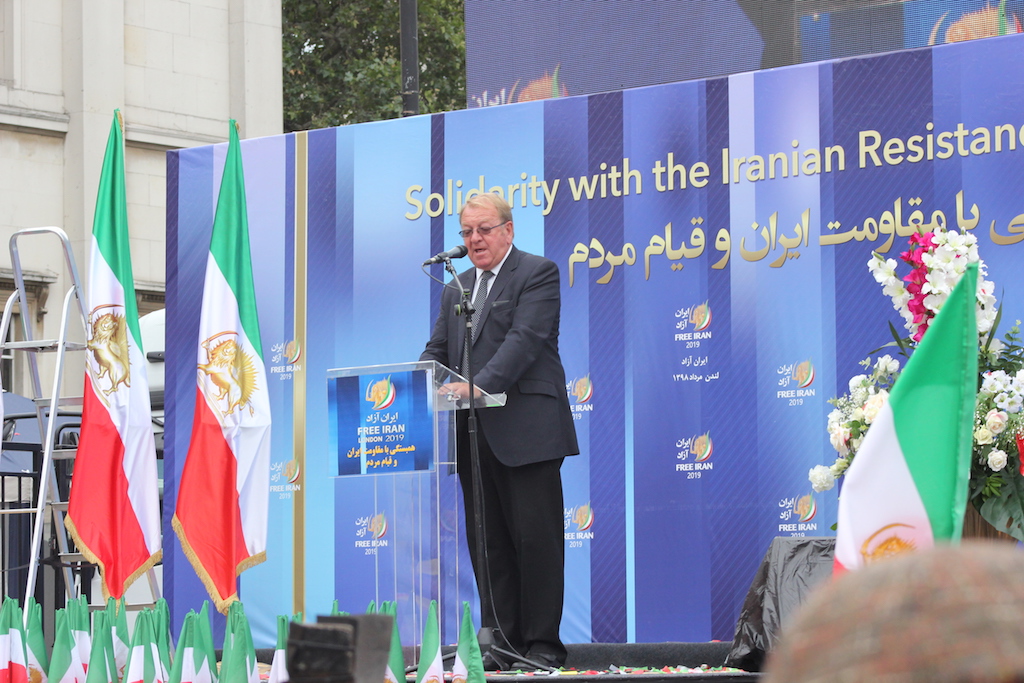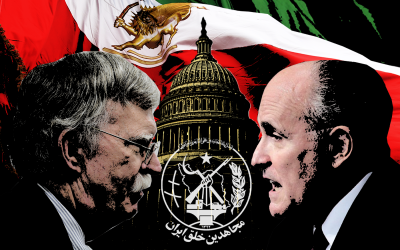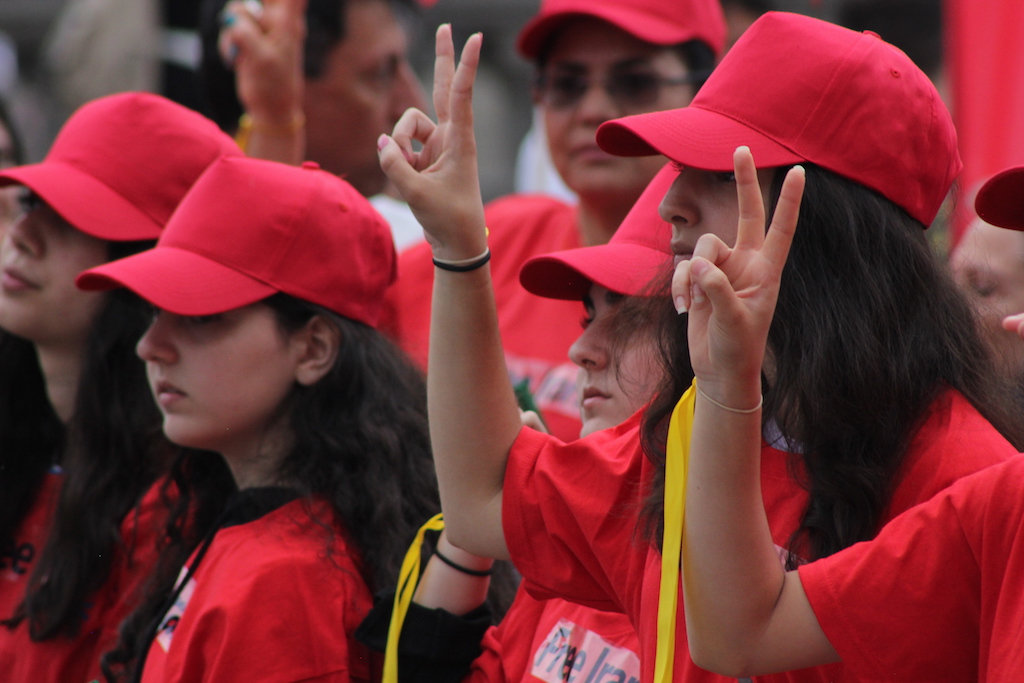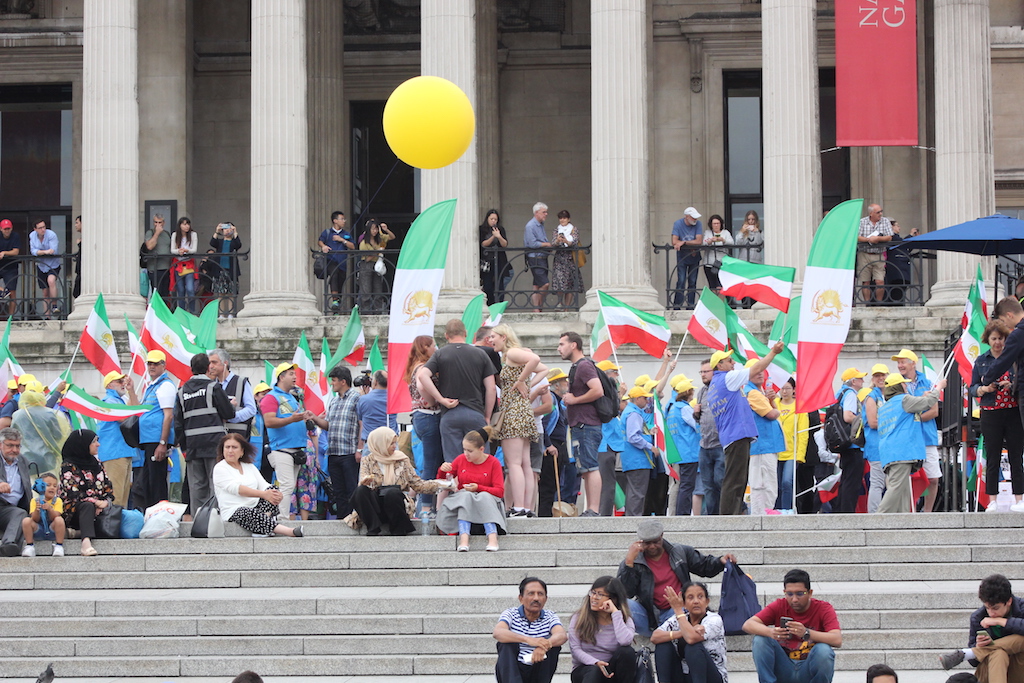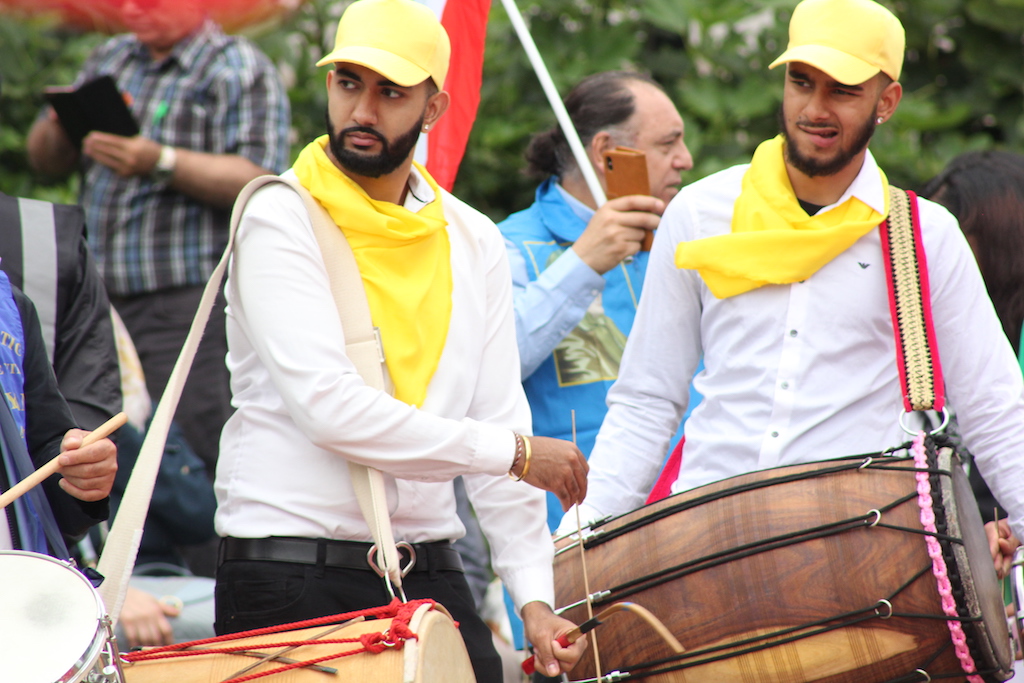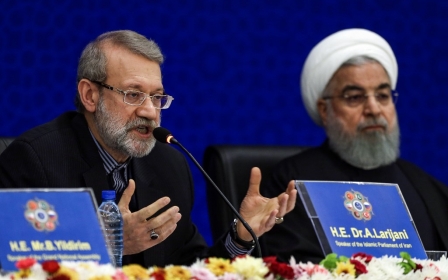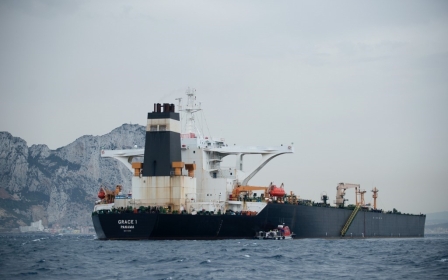Stop the appeasement Boris! Controversial Iranian opposition group rallies in London
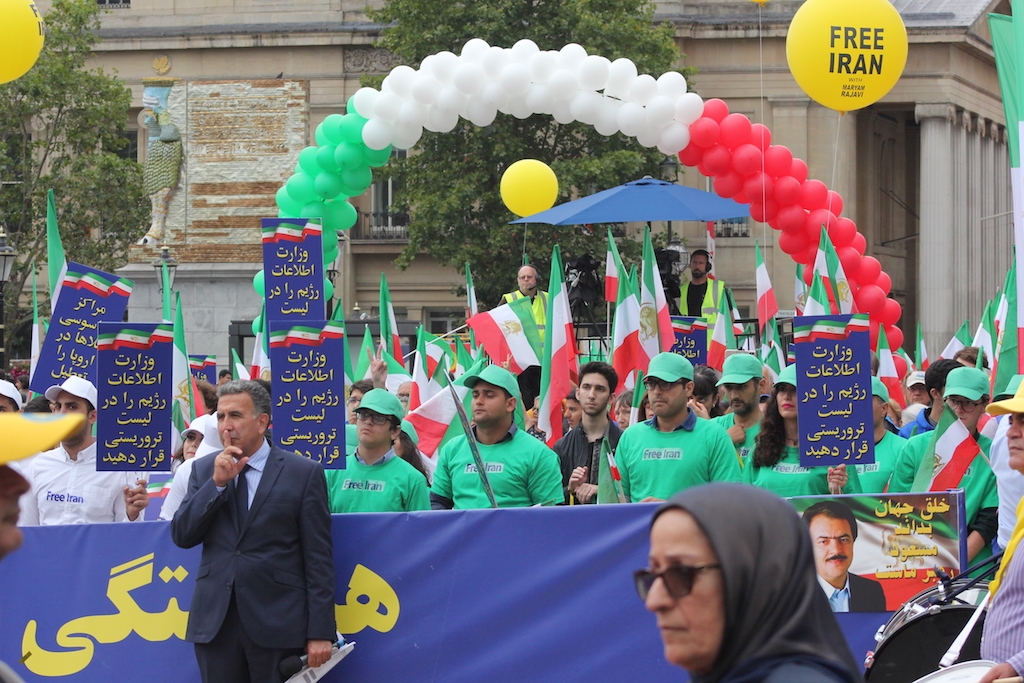
Supporters of a controversial Iranian opposition movement have called on Britain’s new prime minister, Boris Johnson, to recognise it as a government in exile and stop the “appeasement” of the Islamic Republic.
At a rally of thousands of supporters of the National Council of Resistance in Iran (NCRI), a series of Iranian exiles and European politicians, including British, Portuguese and Irish parliamentarians, voiced their support for the group and declared their leader Maryam Rajavi the rightful president of Iran.
As rain clouds gathered above them in London’s Trafalgar Square, NCRI supporters chanted anti-Islamic Republic slogans and the name of Rajavi, while drummers beat martial rhythms and a number of musician guests sang soaring patriotic songs.
Floating yellow balloons carried the words “Free Iran with Maryam Rajavi”, while all the headscarved women at the event wore matching blue hijabs replicating the one Rajavi is always pictured in at public events.
The NCRI, though nominally an umbrella group, is largely dominated by the Mujahideen e-Khalq (MEK), an organisation founded in the mid-1960s in Iran in opposition to the then-ruler Shah Reza Pahlavi. Though the group was initially supportive of the the 1979 Islamic Revolution, it quickly fell out with new ruler Ruhollah Khomeini.
The organisers said the meeting was one of six happening concurrently in other European cities, coming at a time of increasing tensions between Iran and the United States and its allies, not least because of the apparent tit-for-tat seizures of oil tankers by the UK and Tehran off the coast of Gibraltar and in the Strait of Hormuz respectively.
“[Boris Johnson] needs to change the policy which has been pursued by previous governments, who seem to be frightened when there’s no need to fear, frightened to oppose the regime in Iran,” said Brian Binley, a former Conservative MP and longtime NCRI supporter.
“We know it’s an evil regime, we know it’s a false regime, we know it’s a regime not supported by the people, we need to take that message to Boris Johnson, and I promise you that I will do all I can with my colleagues to do just that.”
Among the other speakers at the event were Conservative MP Matthew Offord, Catherine Noone, deputy leader of the Irish senate, Jim Higgins, a former member of the Presidium of the European Parliament, Irish Senator Gerry Horgan and Labour MP Roger Godsiff.
“I fully agree with my colleagues and what the other speakers have said with regards to the UK recognising the right of the people of Iran to change the religious dictatorship and support the NCRI, its president elect Maryam Rajavi and her 10-point democratic platform for a future for Iran,” said Godsiff.
“It provides a clear roadmap to establish a free and democratic Iran.”
He, and other speakers, also called on the UK government to follow the US in listing the Islamic Revolutionary Guard Corps, Iran's military elite, as a terrorist organisation. At present only the Quds Force sub-unit is listed as a terrorist organisation in the UK and EU.
Theresa Villiers, a longtime supporter of the MEK in the British parliament, was also set to speak at the event, but pulled out, which an organiser attributed to her promotion to UK environment secretary earlier this week.
At one point it was announced that a message was to be forthcoming from Massoud Rajavi, the organisation’s founder and husband of Maryam, who has not been seen in public (and presumed dead by many) for years.
The video displayed, however, consisted of old footage and speeches spliced together into a new package.
Although the NCRI/MEK has numerous high-profile supporters across the globe - including US National Security Advisor John Bolton and former New York Mayor Rudy Giuliani - the group has been described as a “cult” in many circles and former members and analysts have said it uses coercive methods against its members.
A report commissioned by the US government in 2009 said the organisation had “many of the typical characteristics of a cult, such as authoritarian control, confiscation of assets, sexual control (including mandatory divorce and celibacy), emotional isolation, forced labour, sleep deprivation, physical abuse and limited exit options”.
Currently based in Albania after being driven from their base in Iraq in 2013 - after what the group claims was Iranian pressure - people have complained of relatives being held and brainwashed in the group’s compound.
However, Perviz Khazai, an NCRI representative, laughed at the suggestion the group was a cult.
“We gathered about two years ago about 100,000 people in Paris. We are gathering so many people, so many millions of people are with us - what kind of cult is that? It’s not a cult,” he told Middle East Eye.
“It’s a pluralist group, we have six political parties, many different religions in it - this is the propaganda of the Iranian regime gestapo.”
Despite concerns about the organisation’s structures and methods, the MEK and its supporters are well known to have suffered severe losses at the hands of the Islamic Republic.
1988 saw the mass execution of thousands of MEK supporters by the Iranian government - the group claims as many as 30,000 were killed - and the group's supporters have been brutally repressed within the country.
“It was 1980, I was only 14 years old, and I was captured and tortured and I lost eight of my teeth - I was almost dead,” Simon, one of the NCRI supporters, told MEE.
Adorned, like many, in a blue jacket adorned with Maryam Rajavi’s face, Simon said he had returned to the streets again after two bouts of jail time and a stint on death row in Iran.
“They said, ‘This is against God, we have to execute you’, and I was supposed to be executed. But because we had one person inside [the jail], he released us in the midnight,” he said.
“So accidently I am alive - but most of my friends have been executed.”
'I don’t think you will find another organisation that has committed so much to humanity and to the world'
- Jane Finnerty, NCRI supporter
Between 1997 and 2012, the US designated the MEK as a terrorist group, while the UK recognised it as one between 2001 and 2008.
Although the organisation espouses non-violence now, in the past they were responsible for numerous bombings inside Iran. During the Iran-Iraq War between 1981 and 1988, the group sided with Saddam Hussein, something which has heavily soured the group’s reputation in Iran, even among opponents of the Islamic Republic.
The group is now thought to receive financial and logistical backing from Israel and Saudi Arabia, who have been ratcheting up tensions with Iran in recent years.
Although the NCRI representative told MEE that the group was opposed to an invasion of Iran, it is an enthusiastic supporter of “regime change” and sanctions. For its supporters, it represent a government in exile, ready to take control if the Islamic Republic falls.
“I’ve been with the Mujahideen for 30 years, and over the years I’ve come to know them as honest and for the freedom of Iranian people - not only Iranian people, but everybody,” said Jane Finnerty, who also wore a Rajavi jacket.
A British woman with an Iranian husband - who she said joined the MEK after his sister was abducted by the Iranian government - Finnerty said the British government should recognise the NCRI as the legitimate government of Iran.
“What they want is freedom for their women, for their men, for their children in Iran,” she said.
“I don’t think you will find another organisation that has committed so much to humanity and to the world.”
Middle East Eye propose une couverture et une analyse indépendantes et incomparables du Moyen-Orient, de l’Afrique du Nord et d’autres régions du monde. Pour en savoir plus sur la reprise de ce contenu et les frais qui s’appliquent, veuillez remplir ce formulaire [en anglais]. Pour en savoir plus sur MEE, cliquez ici [en anglais].


